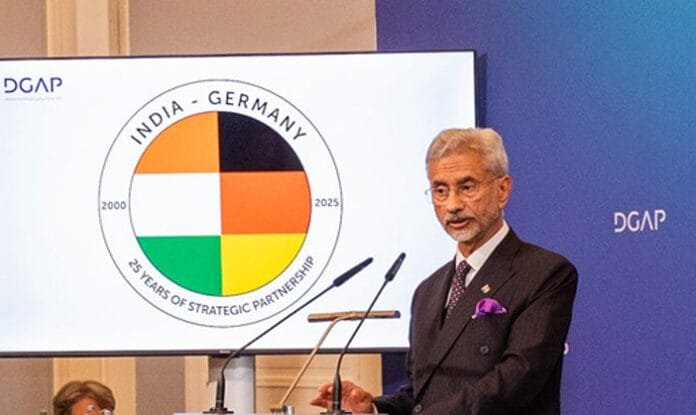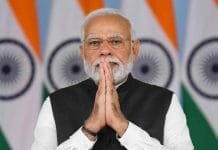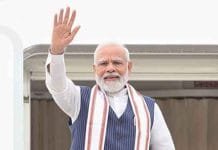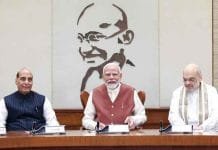INVC NEWS
Berlin – : India’s External Affairs Minister, Dr. S. Jaishankar, delivered a strong, unequivocal message from Berlin on Friday in the aftermath of the Pahalgam terror attack, stating that India reserves the sovereign right to defend its people and territory. Speaking during a high-level dialogue at the German Council on Foreign Relations, Jaishankar firmly reiterated India’s commitment to eliminating terrorism and underscored the strategic significance of ‘Operation Sindoor’—India’s swift military retaliation against Pakistan-based terror camps.
India’s Zero Tolerance: Terrorism Will Be Met With Force
“We will not tolerate terrorism. We will not yield to nuclear blackmail,” Jaishankar declared, drawing a clear line against threats emanating from India’s western neighbor. The minister emphasized that the Pahalgam attack, which claimed 26 innocent lives, was not an isolated incident but part of a calculated campaign orchestrated to disrupt peace in Jammu and Kashmir, undermine tourism, and incite religious tensions in the region.
With a strong and unwavering voice, Jaishankar added, “This attack was part of a broader pattern targeting not just Kashmir, but India as a whole. The intention is to terrorize, destabilize, and divide.” India, he said, would not let such actions go unanswered.
What is ‘Operation Sindoor’? A Decisive Strike Against Terrorism
Following the brutal attack on April 22, 2025, India launched a precision counter-offensive, ‘Operation Sindoor’, aimed at crippling the terror infrastructure festering across the Line of Control. The operation involved targeted missile and drone strikes on nine identified terrorist camps in Pakistan and Pakistan-occupied Kashmir (PoK)—a calculated move executed with surgical accuracy.
According to defense sources, these camps were hosting elements affiliated with banned terror outfits responsible for previous attacks in Pulwama, Uri, and Pathankot. The military objectives were clear: eliminate leadership, dismantle logistics hubs, and degrade Pakistan’s proxy war machinery.
Prime Minister Narendra Modi called Operation Sindoor a “new normal”—a declarative shift in India’s strategic doctrine. From this point forward, any cross-border terror attack will be viewed not as an isolated act of violence but as an act of war against the Republic of India.
Global Consensus Builds Around India’s Right to Self-Defense
In Berlin, Jaishankar thanked German Foreign Minister Annalena Baerbock and Chancellor Olaf Scholz for their unwavering support. He acknowledged Germany’s clear position: “India has the right to self-defense. We are grateful that Germany, along with many others, has recognized this right and condemned the cowardly terrorist act.”
He further noted that international understanding regarding India’s actions had grown significantly. “Unlike in the past, there is now very little tolerance globally for terrorism, regardless of its origin,” he said. “If we state that we are acting to defend our people, most democratic nations will stand with us.”
A Pattern of Terror: The Long Shadow of Pakistan’s Proxy War
India has consistently maintained that Pakistan continues to use terrorism as a state policy. For decades, terrorist groups nurtured on Pakistani soil have orchestrated attacks against India’s civilians and security personnel. The April 22 attack in Pahalgam bore the unmistakable fingerprints of such a strategy.
Intelligence reports have confirmed that the attackers infiltrated from PoK and were armed with advanced weaponry and satellite communication systems—tools provided by Pakistan’s intelligence agencies.
“The world must stop treating Pakistan as a victim of terrorism,” Jaishankar said. “It is a perpetrator. This attack is just the latest in a long history of violence exported across the border with impunity.”
Strategic Shift: India’s Counterterrorism Doctrine Enters a New Phase
Operation Sindoor is not just a tactical victory—it represents a strategic inflection point. Under the new doctrine articulated by PM Modi and supported by India’s diplomatic corps, India will no longer exercise restraint when faced with cross-border terror. The policy shift moves from deterrence by denial to deterrence by punishment.
India’s strike capabilities, especially with advanced drone warfare and satellite-guided missiles, were put on full display. The Air Force and Army executed coordinated maneuvers, ensuring minimal collateral damage while maximizing target impact.
Diplomatic Offensive: Isolating Pakistan on the World Stage
Post-Operation Sindoor, India launched a parallel diplomatic offensive. Indian missions worldwide were instructed to brief foreign governments about the specifics of the Pahalgam attack and the rationale behind Operation Sindoor.
At the United Nations, India submitted detailed dossiers implicating Pakistan’s hand in cross-border terrorism. Several countries, including France, Japan, Australia, and the UAE, have echoed India’s concerns and condemned the attack.
Germany’s Foreign Minister stated on record: “Terrorism has no justification. India has every right to secure its borders and protect its citizens. We support India’s call for global cooperation against this menace.”
Kashmir’s Tourism Industry: A Target of Terror
The choice of Pahalgam—a scenic tourist destination—was deliberate. Jaishankar pointed out that terrorists aimed to disrupt economic recovery in Kashmir, especially tourism which had begun to flourish again in the region.
“By attacking Pahalgam, they wanted to destroy the confidence of travelers and investors. But we will not let them succeed,” he asserted.
Indeed, tourism stakeholders in the valley have vowed to continue their operations. The government, in response, has increased security in tourist zones, ensuring that Kashmir remains open, safe, and welcoming.
India’s Message to the World: We Will Not Be Intimidated
India’s response to the Pahalgam attack has been clear, calculated, and firm. From New Delhi to Berlin, the message resonates: India will respond decisively to terror. There will be no tolerance, no strategic patience, and certainly no negotiation under threat.
By executing Operation Sindoor and securing widespread diplomatic backing, India has redefined the rules of engagement with hostile forces and nations that harbor them.
Conclusion: Unity Against Terrorism Is the Only Way Forward
As Dr. Jaishankar rightly said, “The time for appeasement is over.” The global order must stand united against terrorism, regardless of its origins. India, with its vast population, democratic values, and strategic location, has emerged not just as a victim of terror but as a leader in the fight against state-sponsored extremism.
Operation Sindoor marks a pivotal chapter in India’s national security doctrine. It sends an unmistakable signal—not just to Pakistan, but to every nation watching—that India will protect its sovereignty and its people, no matter the cost.















